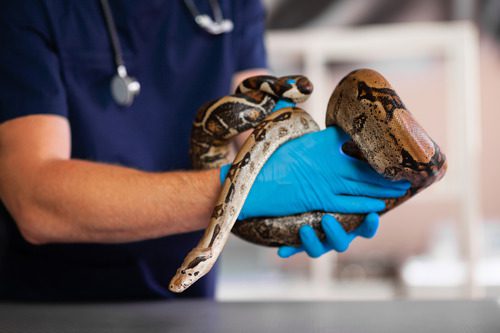Tips for Taking Care of a Snake
Taking care of a snake can be a fascinating and rewarding experience. As exotic pets, snakes have specific needs that differ significantly from traditional pets like dogs and cats. This guide will cover essential aspects of snake care, ensuring that your scaly companion remains healthy and happy. If you have any concerns or need expert advice, feel free to contact Paws and Claws Animal Medical Center in Dunedin, FL, at (727) 953-6588.

Choosing the Right Snake
Before you bring a snake home, it’s essential to understand that not all snakes make ideal pets for beginners. Research the species that are known for being more manageable, such as corn snakes, ball pythons, and garter snakes. Consider factors like the snake’s adult size, diet, and habitat requirements. It’s also wise to choose a snake that has been bred in captivity, as these animals are generally healthier and more accustomed to living in enclosures.
Considering the Snake’s Temperament
Some species are more docile and easier to handle, making them perfect for first-time owners. For example, ball pythons are known for their gentle nature and are less likely to be stressed by regular handling.
Setting Up the Habitat
A proper habitat is crucial for your snake’s health and well-being. The enclosure should be large enough for your snake to move around freely and should include a secure lid, as snakes are adept at escaping. You will need to create a temperature gradient in the enclosure, with a warm side and a cool side, to help regulate your snake’s body temperature.
Temperature and Lighting
Install heating pads or lamps to maintain the appropriate temperature range, which varies depending on the species. Most snakes also require a light cycle that mimics natural daylight, typically 12 hours on and 12 hours off.
Substrate and Hideaways
Choose a safe substrate, like aspen shavings or paper products, that will not cause impaction if ingested. Providing hideaways in the habitat is also important for your snake’s sense of security and stress reduction.
Feeding Your Snake
Snakes are carnivores, and most pet snakes thrive on a diet of rodents. The size of the prey should be appropriate for the size of the snake’s head and midsection. Feed your snake pre-killed prey to avoid any injuries that live prey could cause. Establish a consistent feeding schedule, typically once a week for adults, and slightly more often for growing juveniles.
Understanding Feeding Behavior
Observe your snake’s behavior to learn its feeding patterns and preferences. Some snakes may prefer to eat at night or in the privacy of a hideaway. If your snake is reluctant to eat, it could be a sign of stress or health issues, prompting a call to our center for advice.
Health and Wellness
Regular health checks are vital for maintaining your snake’s health. Look for signs of respiratory infections, such as wheezing or excess mucus around the nose and mouth, and skin infections, which might show as discolored scales or unusual shedding patterns. Ensure that your snake’s habitat is clean and maintained with regular changes of substrate and clean water.
Recognizing Signs of Stress
Stress in snakes can manifest as refusal to eat, frequent hiding, or aggressive behavior. Factors that can stress a snake include excessive handling, a noisy environment, or an improper habitat setup.
Encouraging Natural Behavior
Enrichment is crucial for keeping your snake mentally and physically stimulated. This can include changes in their habitat, like rearranging the décor or introducing new objects to explore. Encouraging natural behaviors helps to keep your snake active and engaged, which is vital for their overall health.
Interaction and Handling
Handle your snake regularly but respectfully to build trust and reduce stress. However, always be mindful of the snake’s reactions and give them space when needed.
Properly Caring for Your Pet Snake
Caring for a snake involves a dedicated commitment to their health, environment, and dietary needs. Providing the right habitat, maintaining a proper feeding schedule, and observing their health are key to a long and healthy life for your snake. If you ever have questions or need support, Paws and Claws Animal Medical Center is just a call away at (727) 953-6588. Our knowledgeable team is ready to assist with any concerns you might have about your snake’s care. Ensuring your snake’s well-being is our priority, and we’re here to help every step of the way.
